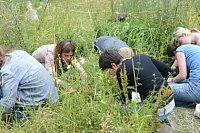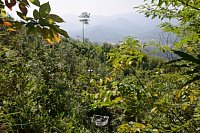![Gutianshan [(c) Christian Ristok] Gutianshan [(c) Christian Ristok]](/im/1401549742_284_0.jpg)
Forschungsprojekte

Vegetationsaufnahme
Unsere Forschungsgruppe konzentriert sich auf Themen wie Community Assembly Regeln, Effekte des Klimawandels auf Vegetation und funktionelle Biodiversitätsforschung.
BEF-China

BEF-China Site A 16.09.2014
Seit 2008 ist Helge Bruelheide der Europäische Sprecher von BEF-China, einem großen Biodiversitäts-Ökosystem-Funktions (BEF)-Experiment mit Bäumen (DFG Forschergruppe FOR 891). BEF-Experimente haben das Ziel, die Effekte von Artenverlust auf Ökosystem-Funktionen wie z.B Produktivität zu erklären. BEF-China ist das größte Baum Diversitäts-Experiment weltweit und befindet sich im subtropischen China (Xingangshan, Jiangxi Provinz). Zufällige und nicht-zufälliger (d.h. gerichteter) Verlust von Arten wurde durch das Anpflanzen von 566 kleinen Wäldchen, die entweder aus 1, 2, 4, 8, 16 oder 24 Arten aus einem Gesamt-Pool von 40 Laubholzarten bestehen. -> http://www.bef-china.de
sPlot – The Global Vegetation Database
Unsere AG ist weiterhin involviert in sPlot, einem strategischen Projekt des iDiv Institutes (idiv.de/splot ), das von Helge Bruelheide geleitet und von Gabriella Damasceno koordiniert wird. sPlot ist die größte globale Datenbank zur taxonomischen, funktionalen und phylogenetischen Pflanzenvielfalt mit mehr als 250 Mitgliedern und fast zwei Millionen Untersuchungsflächen. Ziel des Projekts ist die Sammlung und Analyse von Vegetationsdaten mit hoher räumlicher Auflösung und globaler Ausdehnung, wobei regelmäßig aktualisierte Versionen der Datenbank veröffentlicht werden. Derzeit arbeiten wir an einer neuen Version, sPlot 4.0, die im ersten Quartal 2023 veröffentlicht werden soll. In dieser Version sollen Ungenauigkeiten bei der geografischen Lage der Flächen und der Beteiligung der Mitwirkenden verringert werden. Außerdem wird sPlot 4.0 Zeitreihen von Versuchsflächen enthalten, die es uns ermöglichen werden, Trends in der Veränderung der biologischen Vielfalt mit hoher räumlicher Auflösung zu untersuchen.
Sie können alle Informationen über sPlot auf unserer Webseite (https://www.idiv.de/en/splot.html ) nachlesen, wo Sie die von sPlot-Mitgliedern entwickelten Forschungsprojekte, die veröffentlichten Arbeiten und die Liste der Mitwirkenden finden. Zögern Sie nicht, eine E-Mail an Gabriella (gabriella.damasceno@idiv.de) zu schicken, wenn Sie Daten haben, die Sie gerne beisteuern möchten!
sMon – Biodiversitätstrends in Deutschland
sMon ist ein Syntheseprojekt am Deutschen Zentrum für integrative Biodiversitätsforschung (iDiv) Halle-Jena-Leipzig in dem unsere AG eine tragende Rolle spielt. Ziel ist es, exemplarische Datensätze über zeitlich-räumliche Veränderungen bei verschiedenen Taxa (z.B. Gefäßpflanzen, Libellen, Fischen, Amphibien) und Habitaten (z.B. Ergebnisse von Biotopkartierungen) zusammenzuführen und die Möglichkeiten und Grenzen für die Analyse von Biodiversitätsveränderungen auszuloten. Das geschieht für verschiedene Zeiträume und Kontrollfrequenzen (periodenweise, unregelmäßig, jährlich) und auf verschiedenen räumlichen Ebenen (abgegrenzte Untersuchungsgebiete, einzelne Bundesländer, bundesweit). Hier entwickeln wir Ansätze zur Harmonisierung der oft aus heterogenen Quellen stammenden Daten verschiedener Qualität und verwenden bzw. entwickeln neue Algorithmen, statistische Methoden sowie unkonventionelle Kombinationen von beiden. Alles mit dem Ziel, belastbare Trends über die Zu- oder Abnahme von Arten ableiten zu können, Informationen über die Ursachen dieser Veränderungen zu gewinnen und Zusammenhänge zwischen verschiedenen Taxa aufzuzeigen, Darauf aufbauend sollen Perspektiven für zukünftige Monitoring-Programme in Deutschland abgeleitet werden. Mehr dazu unter: https://www.idiv.de/smon
Faktencheck Artenvielfalt
Der Faktencheck Artenvielfalt ist ein Projekt zur umfassenden Einschätzung und Bewertung der Artenvielfalt in Deutschland. Dieses Assessment wird gemeinsam von 120 Autor*innen aus Natur- und Sozialwissenschaften sowie der Praxis gemeinsam erstellt. Finanziert wird der Faktencheck Artenvielfalt durch das Bundesministerium für Bildung und Forschung (BMBF) im Rahmen der Forschungsinitiative zum Erhalt der Artenvielfalt. Helge Bruelheide und Maria Sporbert sind Teil der Projektleitung und bearbeiten den Themenbereich „Trends & Direkte Treiber“ zur Quantifizierung von Biodiversitätstrends über alle Artengruppen an Pflanzen und Tieren sowie der Analyse der direkten Treiber dieser Trends. Link zur Homepage: https://www.feda.bio/de/faktencheck-artenvielfalt/




